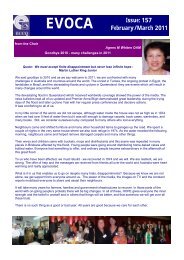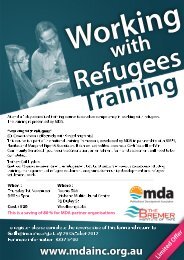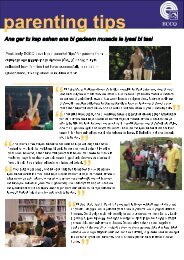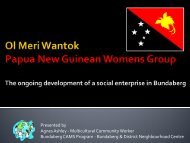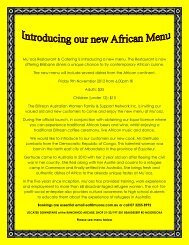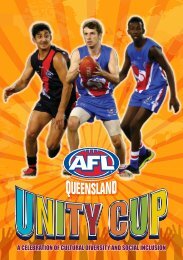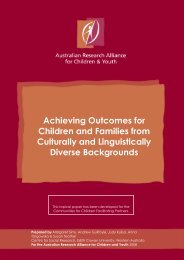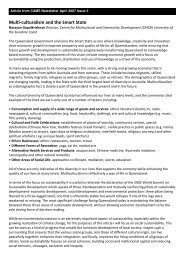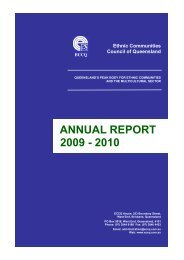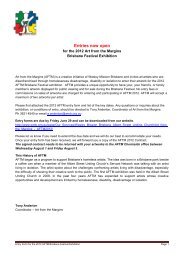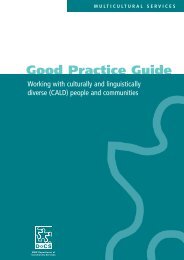ANNUAL REPORT
Annual-Report-2004-2.. - Ethnic Communities Council Queensland
Annual-Report-2004-2.. - Ethnic Communities Council Queensland
- No tags were found...
Create successful ePaper yourself
Turn your PDF publications into a flip-book with our unique Google optimized e-Paper software.
Chair - Nick Xynias AO BEM<br />
It gives me great pleasure to present to the members<br />
of the Ethnic Communities Council of Queensland<br />
this annual report for the year ended 30 June 2005.<br />
The year has been one of solid growth and<br />
consolidation for ECCQ as a group – growth in our<br />
service divisions, Diversicare and Berlasco Court,<br />
and consolidation at ECCQ House.<br />
Each of these areas is reported on in detail in this<br />
annual report by the responsible managers.<br />
Global terrorism remained a constant threat, bringing<br />
the issue of multiculturalism and migration<br />
policy into sharp focus. Indeed, multiculturalism as<br />
public policy is at a crossroads.<br />
Multiculturalism is one of the most successful<br />
contemporary public policies of Australia. It<br />
changed the face of Australia, the nature of our<br />
democracy, the shape of our relations with the<br />
world.<br />
Only 50 years ago Australia was a relatively<br />
unsophisticated country, marked by racism, open<br />
discrimination and a policy of assimilation. Today<br />
Australia is a sophisticated pluralistic society, well<br />
adjusted to a globalised world, and with policies<br />
and laws prohibiting discrimination.<br />
Ethnic groups can take credit for significant<br />
contributions to this change.<br />
But multiculturalism is, possibly inevitably, a victim<br />
of its own success.<br />
Those born and educated in Australia of migrant<br />
parents simply say: “We are Australians.” They<br />
value their parents' heritage, but are not interested<br />
in participating in their clubs and organisations. The<br />
majority are comfortable accessing mainstream<br />
institutions and participating in today's multicultural<br />
Australia. They see no need to participate in<br />
the multicultural movement. They take multicultural<br />
Australia for granted.<br />
But those who made Australia home, the heroes of<br />
the multicultural revolution, are ageing. Their clubs<br />
face financial difficulties because their membership<br />
has aged and do not provide as much support as<br />
they did a few years ago. The great communities of<br />
the Sixties and Seventies - Italians, Greeks, Poles,<br />
Germans, Dutch, Yugoslavs - are no longer so active<br />
in public affairs nor as politically influential.<br />
There are no natural successors to these<br />
communities. The new communities established<br />
between the late Seventies and now are not taking<br />
over the organised multicultural movement.<br />
The Anglo Celtic part of our community embraced<br />
multiculturalism and enjoys its fruits but have not<br />
become active participants in the multicultural<br />
movement. They enjoy it but do not own it.<br />
Somehow, the word ethnic was replaced by the<br />
word multicultural but without<br />
a corresponding expansion of<br />
the movement. Public sympathy<br />
for demands by multicultural<br />
groups has waned. The high<br />
moral ground gained by ethnic communities in the<br />
mid-Seventies resulted in a range of policies to<br />
redress factual and perceived injustices.<br />
The focus of these policies was on welfare services<br />
and greater cultural freedom. Few Australians<br />
would now regard migrants, especially migrants<br />
who settled here some time ago, as in need of<br />
greater welfare.<br />
Migrant success in education, business and the arts<br />
is unquestionable. One third of BRW’s 200 Richest<br />
Australians list are post-WWII migrants. Migrants<br />
are no longer seen as victims of disadvantage.<br />
I am not convinced that the multicultural movement<br />
as we knew it will recover. I do not see the<br />
organisational willpower, the financial resources or<br />
the political climate to accomplish it.<br />
Today, many of the battles have been won, in large<br />
part, and new and emerging communities do not<br />
always recognize the need for collective action and<br />
unity.<br />
This is a pity and could be costly – in our current<br />
climate of fear and threat it won’t take much for<br />
years of hard work to be lost with relatively minor<br />
legislative and policy changes.<br />
We must form strategic alliances with national<br />
institutions and mechanisms that support diversity.<br />
Unfortunately, new migrants and minority religions<br />
can still be neglected in public policy and Islamic<br />
groups in Australia remain concerned about antiterrorism<br />
laws they feel target them. It is a real<br />
concern for many Muslims in Australia. We must go<br />
out of our way to address such fears.<br />
We, especially, must speak out on behalf of the<br />
oppressed and that means, in Australia, asylum<br />
seekers who have been shamefully locked away,<br />
sometimes for many years.<br />
We must all raise our voices in the democratic<br />
process to have this awful legislation, indefinite<br />
detention of asylum seekers, repealed.<br />
An important distinction, in danger of being blurred<br />
through political correctness, is that we are a multicultural<br />
country. We are not a country of multinations.<br />
Citizenship is the bedrock of our<br />
democratic future. We must develop in our children<br />
respect for their ethnic cultural identities. But a<br />
greater aim, surely, must be to promote and defend<br />
the democratic principles we stand for, to foster<br />
pride in our nation, pride in being Australian.<br />
cont’d next page<br />
ECCQ Annual Report 2004-2005<br />
5



